Accounting Research Project: Sustainability and Financial Performance
VerifiedAdded on 2022/08/20
|7
|2218
|10
Project
AI Summary
This accounting research project investigates the impact of corporate sustainability practices on financial performance. The study employs a qualitative research methodology, analyzing secondary data from ASX-listed companies between 2015 and 2019. The research explores the influence of sustainability on profitability, considering theoretical frameworks like agency theory, stakeholder theory, and legitimacy theory. The literature review examines the relationship between sustainability and financial outcomes, finding a positive correlation. The project concludes that sustainability is crucial for long-term organizational success, highlighting the need for businesses to prioritize environmental and social considerations to enhance financial performance. The project also uses ethical considerations and discusses the importance of sustainability reporting.
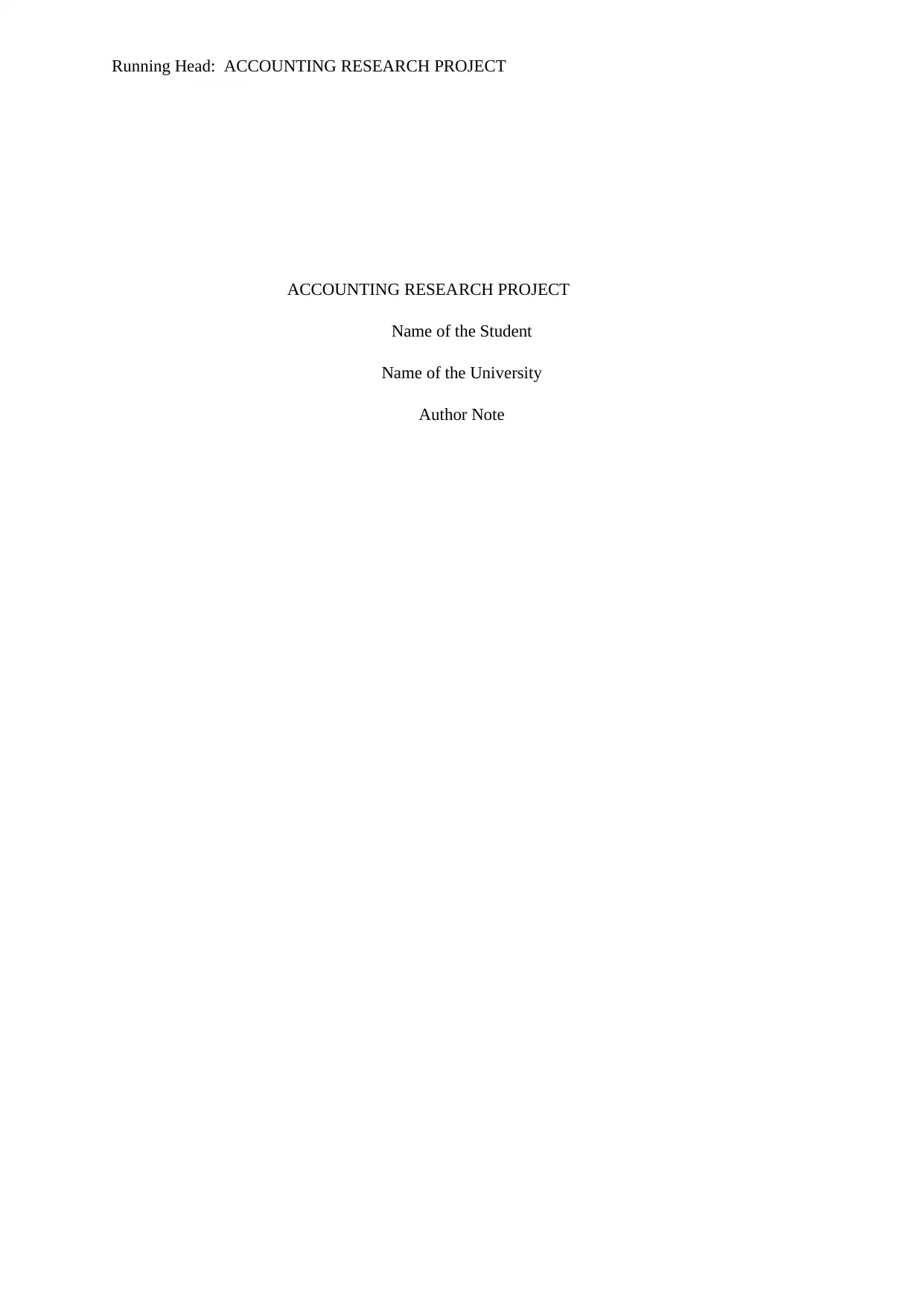
Running Head: ACCOUNTING RESEARCH PROJECT
ACCOUNTING RESEARCH PROJECT
Name of the Student
Name of the University
Author Note
ACCOUNTING RESEARCH PROJECT
Name of the Student
Name of the University
Author Note
Paraphrase This Document
Need a fresh take? Get an instant paraphrase of this document with our AI Paraphraser
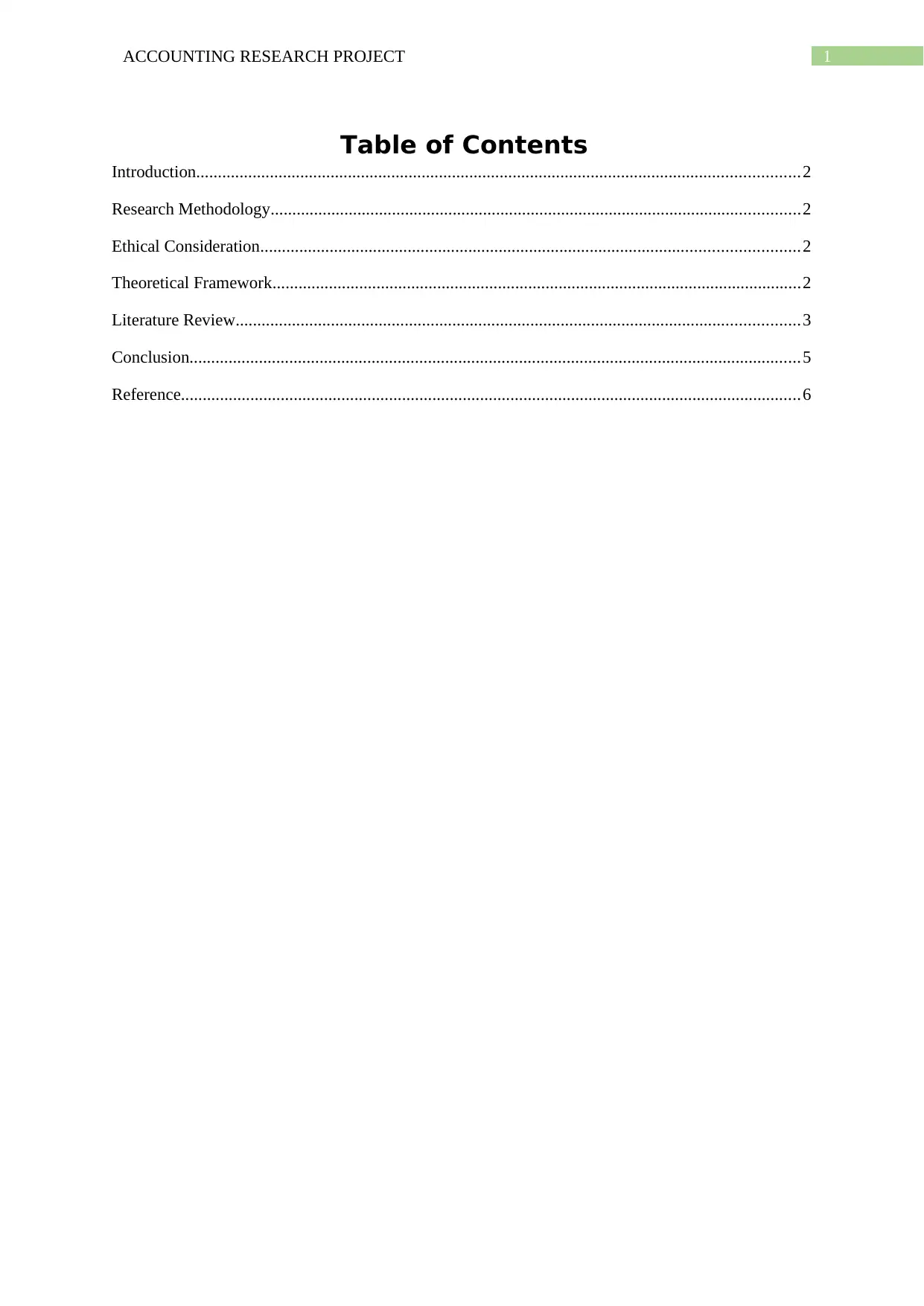
1ACCOUNTING RESEARCH PROJECT
Table of Contents
Introduction...........................................................................................................................................2
Research Methodology..........................................................................................................................2
Ethical Consideration............................................................................................................................2
Theoretical Framework..........................................................................................................................2
Literature Review..................................................................................................................................3
Conclusion.............................................................................................................................................5
Reference...............................................................................................................................................6
Table of Contents
Introduction...........................................................................................................................................2
Research Methodology..........................................................................................................................2
Ethical Consideration............................................................................................................................2
Theoretical Framework..........................................................................................................................2
Literature Review..................................................................................................................................3
Conclusion.............................................................................................................................................5
Reference...............................................................................................................................................6
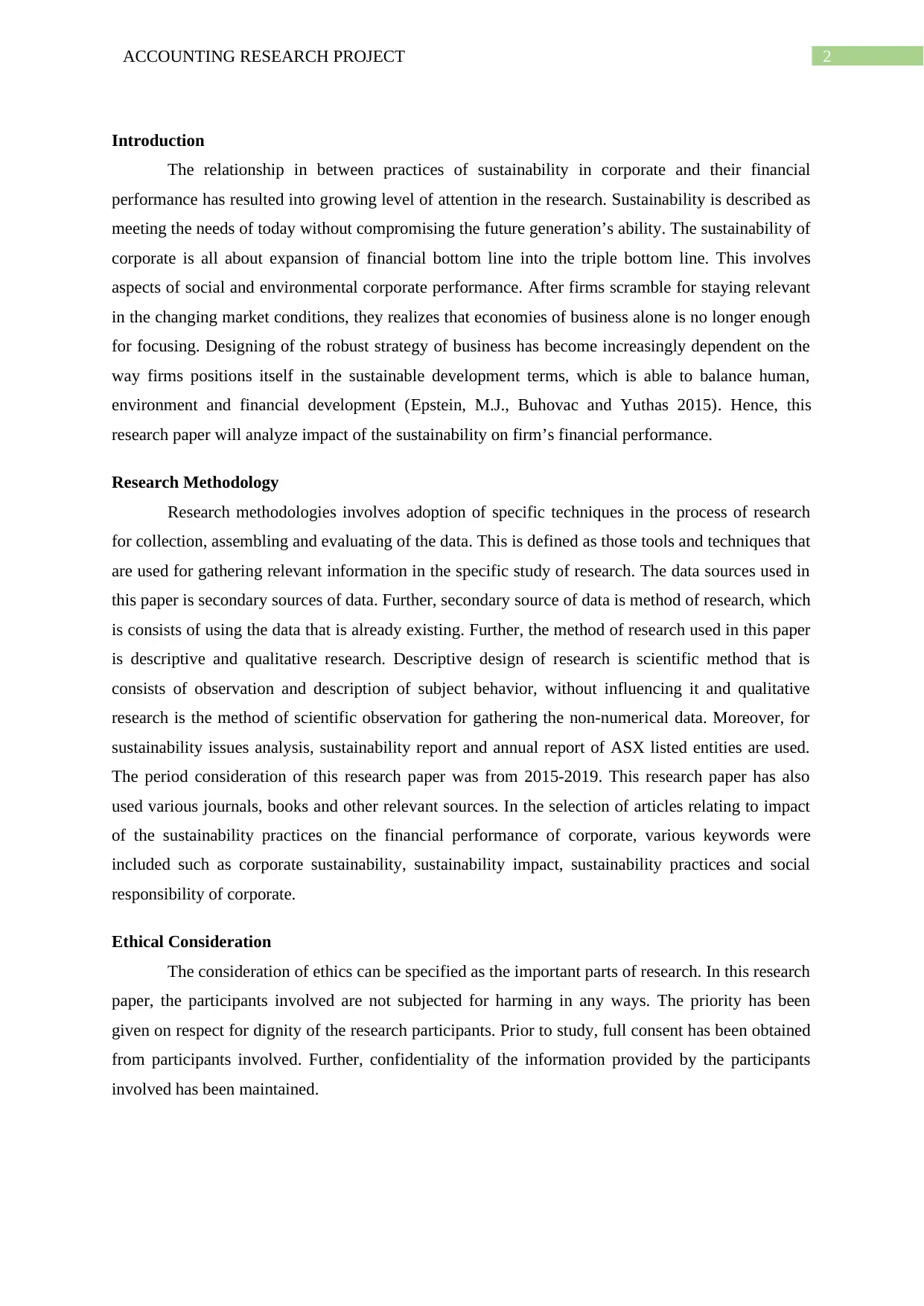
2ACCOUNTING RESEARCH PROJECT
Introduction
The relationship in between practices of sustainability in corporate and their financial
performance has resulted into growing level of attention in the research. Sustainability is described as
meeting the needs of today without compromising the future generation’s ability. The sustainability of
corporate is all about expansion of financial bottom line into the triple bottom line. This involves
aspects of social and environmental corporate performance. After firms scramble for staying relevant
in the changing market conditions, they realizes that economies of business alone is no longer enough
for focusing. Designing of the robust strategy of business has become increasingly dependent on the
way firms positions itself in the sustainable development terms, which is able to balance human,
environment and financial development (Epstein, M.J., Buhovac and Yuthas 2015). Hence, this
research paper will analyze impact of the sustainability on firm’s financial performance.
Research Methodology
Research methodologies involves adoption of specific techniques in the process of research
for collection, assembling and evaluating of the data. This is defined as those tools and techniques that
are used for gathering relevant information in the specific study of research. The data sources used in
this paper is secondary sources of data. Further, secondary source of data is method of research, which
is consists of using the data that is already existing. Further, the method of research used in this paper
is descriptive and qualitative research. Descriptive design of research is scientific method that is
consists of observation and description of subject behavior, without influencing it and qualitative
research is the method of scientific observation for gathering the non-numerical data. Moreover, for
sustainability issues analysis, sustainability report and annual report of ASX listed entities are used.
The period consideration of this research paper was from 2015-2019. This research paper has also
used various journals, books and other relevant sources. In the selection of articles relating to impact
of the sustainability practices on the financial performance of corporate, various keywords were
included such as corporate sustainability, sustainability impact, sustainability practices and social
responsibility of corporate.
Ethical Consideration
The consideration of ethics can be specified as the important parts of research. In this research
paper, the participants involved are not subjected for harming in any ways. The priority has been
given on respect for dignity of the research participants. Prior to study, full consent has been obtained
from participants involved. Further, confidentiality of the information provided by the participants
involved has been maintained.
Introduction
The relationship in between practices of sustainability in corporate and their financial
performance has resulted into growing level of attention in the research. Sustainability is described as
meeting the needs of today without compromising the future generation’s ability. The sustainability of
corporate is all about expansion of financial bottom line into the triple bottom line. This involves
aspects of social and environmental corporate performance. After firms scramble for staying relevant
in the changing market conditions, they realizes that economies of business alone is no longer enough
for focusing. Designing of the robust strategy of business has become increasingly dependent on the
way firms positions itself in the sustainable development terms, which is able to balance human,
environment and financial development (Epstein, M.J., Buhovac and Yuthas 2015). Hence, this
research paper will analyze impact of the sustainability on firm’s financial performance.
Research Methodology
Research methodologies involves adoption of specific techniques in the process of research
for collection, assembling and evaluating of the data. This is defined as those tools and techniques that
are used for gathering relevant information in the specific study of research. The data sources used in
this paper is secondary sources of data. Further, secondary source of data is method of research, which
is consists of using the data that is already existing. Further, the method of research used in this paper
is descriptive and qualitative research. Descriptive design of research is scientific method that is
consists of observation and description of subject behavior, without influencing it and qualitative
research is the method of scientific observation for gathering the non-numerical data. Moreover, for
sustainability issues analysis, sustainability report and annual report of ASX listed entities are used.
The period consideration of this research paper was from 2015-2019. This research paper has also
used various journals, books and other relevant sources. In the selection of articles relating to impact
of the sustainability practices on the financial performance of corporate, various keywords were
included such as corporate sustainability, sustainability impact, sustainability practices and social
responsibility of corporate.
Ethical Consideration
The consideration of ethics can be specified as the important parts of research. In this research
paper, the participants involved are not subjected for harming in any ways. The priority has been
given on respect for dignity of the research participants. Prior to study, full consent has been obtained
from participants involved. Further, confidentiality of the information provided by the participants
involved has been maintained.
⊘ This is a preview!⊘
Do you want full access?
Subscribe today to unlock all pages.

Trusted by 1+ million students worldwide
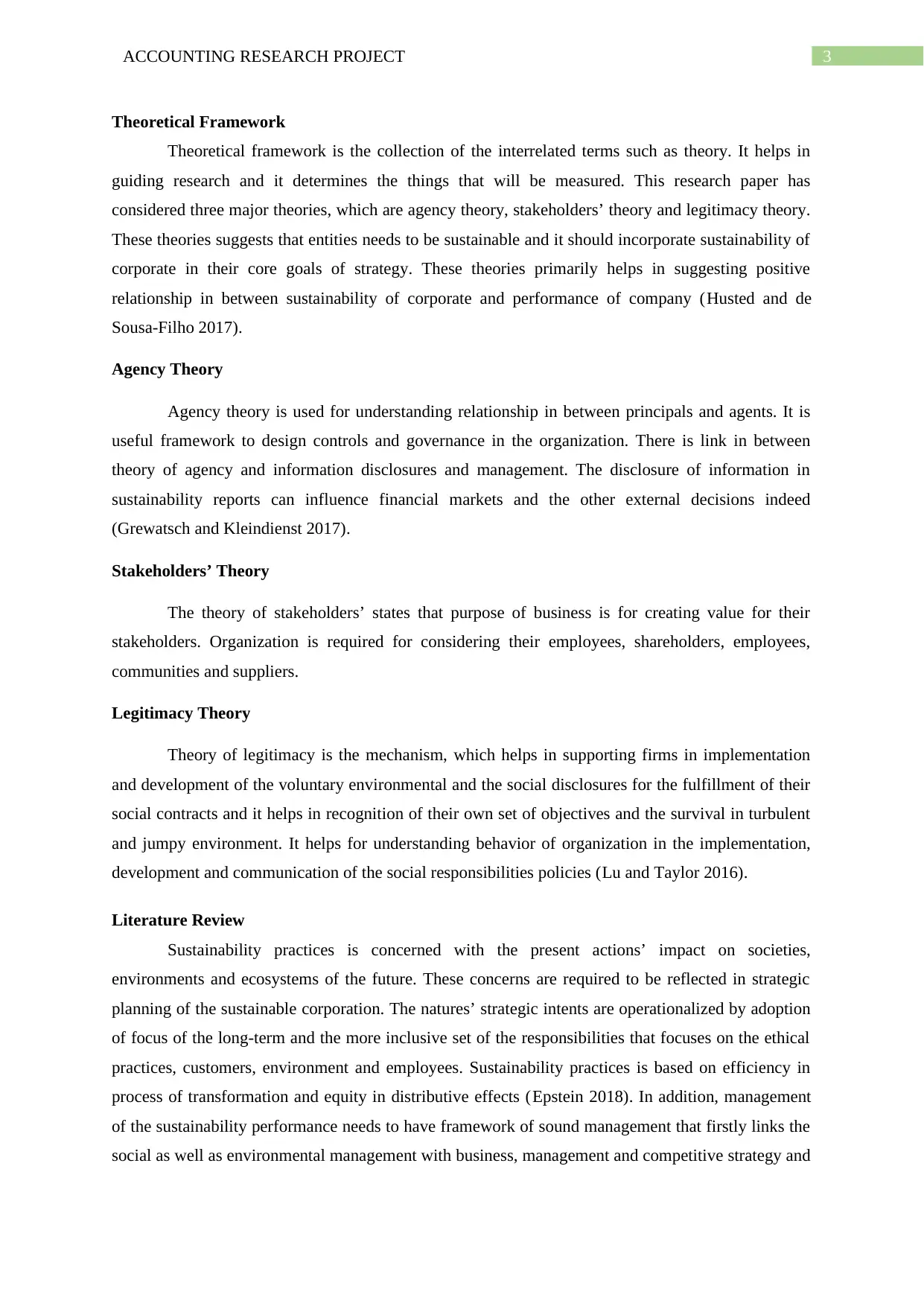
3ACCOUNTING RESEARCH PROJECT
Theoretical Framework
Theoretical framework is the collection of the interrelated terms such as theory. It helps in
guiding research and it determines the things that will be measured. This research paper has
considered three major theories, which are agency theory, stakeholders’ theory and legitimacy theory.
These theories suggests that entities needs to be sustainable and it should incorporate sustainability of
corporate in their core goals of strategy. These theories primarily helps in suggesting positive
relationship in between sustainability of corporate and performance of company (Husted and de
Sousa-Filho 2017).
Agency Theory
Agency theory is used for understanding relationship in between principals and agents. It is
useful framework to design controls and governance in the organization. There is link in between
theory of agency and information disclosures and management. The disclosure of information in
sustainability reports can influence financial markets and the other external decisions indeed
(Grewatsch and Kleindienst 2017).
Stakeholders’ Theory
The theory of stakeholders’ states that purpose of business is for creating value for their
stakeholders. Organization is required for considering their employees, shareholders, employees,
communities and suppliers.
Legitimacy Theory
Theory of legitimacy is the mechanism, which helps in supporting firms in implementation
and development of the voluntary environmental and the social disclosures for the fulfillment of their
social contracts and it helps in recognition of their own set of objectives and the survival in turbulent
and jumpy environment. It helps for understanding behavior of organization in the implementation,
development and communication of the social responsibilities policies (Lu and Taylor 2016).
Literature Review
Sustainability practices is concerned with the present actions’ impact on societies,
environments and ecosystems of the future. These concerns are required to be reflected in strategic
planning of the sustainable corporation. The natures’ strategic intents are operationalized by adoption
of focus of the long-term and the more inclusive set of the responsibilities that focuses on the ethical
practices, customers, environment and employees. Sustainability practices is based on efficiency in
process of transformation and equity in distributive effects (Epstein 2018). In addition, management
of the sustainability performance needs to have framework of sound management that firstly links the
social as well as environmental management with business, management and competitive strategy and
Theoretical Framework
Theoretical framework is the collection of the interrelated terms such as theory. It helps in
guiding research and it determines the things that will be measured. This research paper has
considered three major theories, which are agency theory, stakeholders’ theory and legitimacy theory.
These theories suggests that entities needs to be sustainable and it should incorporate sustainability of
corporate in their core goals of strategy. These theories primarily helps in suggesting positive
relationship in between sustainability of corporate and performance of company (Husted and de
Sousa-Filho 2017).
Agency Theory
Agency theory is used for understanding relationship in between principals and agents. It is
useful framework to design controls and governance in the organization. There is link in between
theory of agency and information disclosures and management. The disclosure of information in
sustainability reports can influence financial markets and the other external decisions indeed
(Grewatsch and Kleindienst 2017).
Stakeholders’ Theory
The theory of stakeholders’ states that purpose of business is for creating value for their
stakeholders. Organization is required for considering their employees, shareholders, employees,
communities and suppliers.
Legitimacy Theory
Theory of legitimacy is the mechanism, which helps in supporting firms in implementation
and development of the voluntary environmental and the social disclosures for the fulfillment of their
social contracts and it helps in recognition of their own set of objectives and the survival in turbulent
and jumpy environment. It helps for understanding behavior of organization in the implementation,
development and communication of the social responsibilities policies (Lu and Taylor 2016).
Literature Review
Sustainability practices is concerned with the present actions’ impact on societies,
environments and ecosystems of the future. These concerns are required to be reflected in strategic
planning of the sustainable corporation. The natures’ strategic intents are operationalized by adoption
of focus of the long-term and the more inclusive set of the responsibilities that focuses on the ethical
practices, customers, environment and employees. Sustainability practices is based on efficiency in
process of transformation and equity in distributive effects (Epstein 2018). In addition, management
of the sustainability performance needs to have framework of sound management that firstly links the
social as well as environmental management with business, management and competitive strategy and
Paraphrase This Document
Need a fresh take? Get an instant paraphrase of this document with our AI Paraphraser
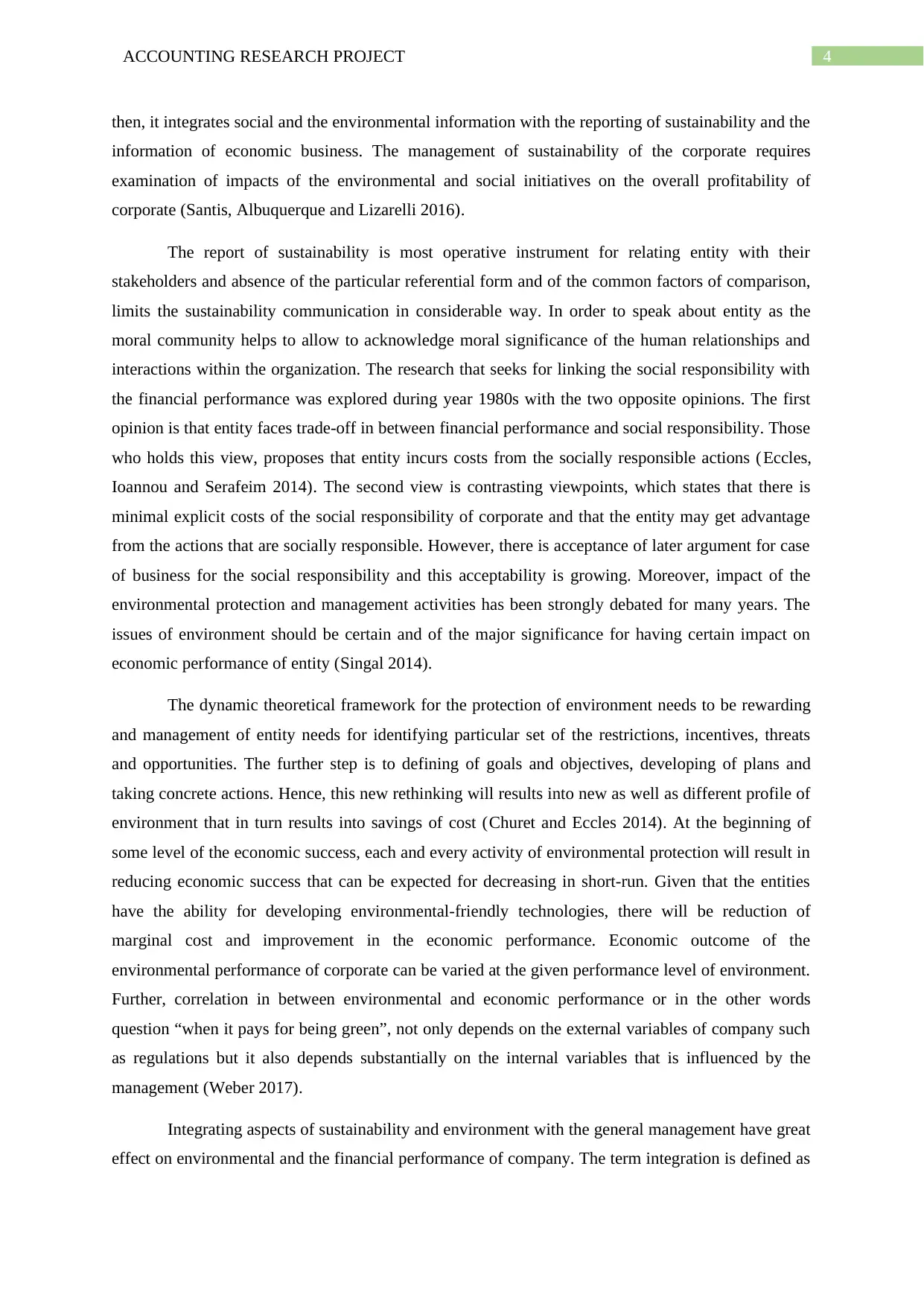
4ACCOUNTING RESEARCH PROJECT
then, it integrates social and the environmental information with the reporting of sustainability and the
information of economic business. The management of sustainability of the corporate requires
examination of impacts of the environmental and social initiatives on the overall profitability of
corporate (Santis, Albuquerque and Lizarelli 2016).
The report of sustainability is most operative instrument for relating entity with their
stakeholders and absence of the particular referential form and of the common factors of comparison,
limits the sustainability communication in considerable way. In order to speak about entity as the
moral community helps to allow to acknowledge moral significance of the human relationships and
interactions within the organization. The research that seeks for linking the social responsibility with
the financial performance was explored during year 1980s with the two opposite opinions. The first
opinion is that entity faces trade-off in between financial performance and social responsibility. Those
who holds this view, proposes that entity incurs costs from the socially responsible actions (Eccles,
Ioannou and Serafeim 2014). The second view is contrasting viewpoints, which states that there is
minimal explicit costs of the social responsibility of corporate and that the entity may get advantage
from the actions that are socially responsible. However, there is acceptance of later argument for case
of business for the social responsibility and this acceptability is growing. Moreover, impact of the
environmental protection and management activities has been strongly debated for many years. The
issues of environment should be certain and of the major significance for having certain impact on
economic performance of entity (Singal 2014).
The dynamic theoretical framework for the protection of environment needs to be rewarding
and management of entity needs for identifying particular set of the restrictions, incentives, threats
and opportunities. The further step is to defining of goals and objectives, developing of plans and
taking concrete actions. Hence, this new rethinking will results into new as well as different profile of
environment that in turn results into savings of cost (Churet and Eccles 2014). At the beginning of
some level of the economic success, each and every activity of environmental protection will result in
reducing economic success that can be expected for decreasing in short-run. Given that the entities
have the ability for developing environmental-friendly technologies, there will be reduction of
marginal cost and improvement in the economic performance. Economic outcome of the
environmental performance of corporate can be varied at the given performance level of environment.
Further, correlation in between environmental and economic performance or in the other words
question “when it pays for being green”, not only depends on the external variables of company such
as regulations but it also depends substantially on the internal variables that is influenced by the
management (Weber 2017).
Integrating aspects of sustainability and environment with the general management have great
effect on environmental and the financial performance of company. The term integration is defined as
then, it integrates social and the environmental information with the reporting of sustainability and the
information of economic business. The management of sustainability of the corporate requires
examination of impacts of the environmental and social initiatives on the overall profitability of
corporate (Santis, Albuquerque and Lizarelli 2016).
The report of sustainability is most operative instrument for relating entity with their
stakeholders and absence of the particular referential form and of the common factors of comparison,
limits the sustainability communication in considerable way. In order to speak about entity as the
moral community helps to allow to acknowledge moral significance of the human relationships and
interactions within the organization. The research that seeks for linking the social responsibility with
the financial performance was explored during year 1980s with the two opposite opinions. The first
opinion is that entity faces trade-off in between financial performance and social responsibility. Those
who holds this view, proposes that entity incurs costs from the socially responsible actions (Eccles,
Ioannou and Serafeim 2014). The second view is contrasting viewpoints, which states that there is
minimal explicit costs of the social responsibility of corporate and that the entity may get advantage
from the actions that are socially responsible. However, there is acceptance of later argument for case
of business for the social responsibility and this acceptability is growing. Moreover, impact of the
environmental protection and management activities has been strongly debated for many years. The
issues of environment should be certain and of the major significance for having certain impact on
economic performance of entity (Singal 2014).
The dynamic theoretical framework for the protection of environment needs to be rewarding
and management of entity needs for identifying particular set of the restrictions, incentives, threats
and opportunities. The further step is to defining of goals and objectives, developing of plans and
taking concrete actions. Hence, this new rethinking will results into new as well as different profile of
environment that in turn results into savings of cost (Churet and Eccles 2014). At the beginning of
some level of the economic success, each and every activity of environmental protection will result in
reducing economic success that can be expected for decreasing in short-run. Given that the entities
have the ability for developing environmental-friendly technologies, there will be reduction of
marginal cost and improvement in the economic performance. Economic outcome of the
environmental performance of corporate can be varied at the given performance level of environment.
Further, correlation in between environmental and economic performance or in the other words
question “when it pays for being green”, not only depends on the external variables of company such
as regulations but it also depends substantially on the internal variables that is influenced by the
management (Weber 2017).
Integrating aspects of sustainability and environment with the general management have great
effect on environmental and the financial performance of company. The term integration is defined as
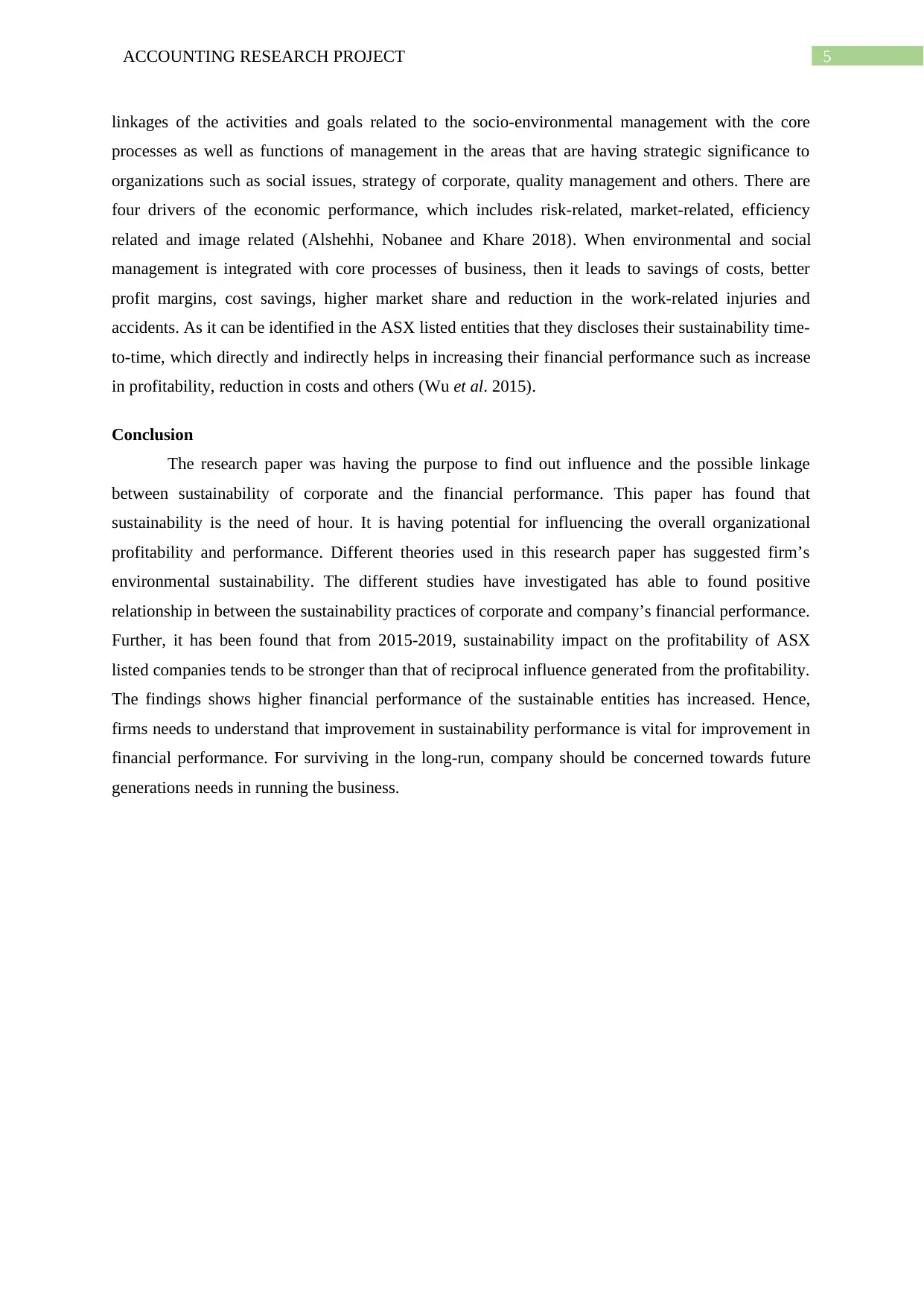
5ACCOUNTING RESEARCH PROJECT
linkages of the activities and goals related to the socio-environmental management with the core
processes as well as functions of management in the areas that are having strategic significance to
organizations such as social issues, strategy of corporate, quality management and others. There are
four drivers of the economic performance, which includes risk-related, market-related, efficiency
related and image related (Alshehhi, Nobanee and Khare 2018). When environmental and social
management is integrated with core processes of business, then it leads to savings of costs, better
profit margins, cost savings, higher market share and reduction in the work-related injuries and
accidents. As it can be identified in the ASX listed entities that they discloses their sustainability time-
to-time, which directly and indirectly helps in increasing their financial performance such as increase
in profitability, reduction in costs and others (Wu et al. 2015).
Conclusion
The research paper was having the purpose to find out influence and the possible linkage
between sustainability of corporate and the financial performance. This paper has found that
sustainability is the need of hour. It is having potential for influencing the overall organizational
profitability and performance. Different theories used in this research paper has suggested firm’s
environmental sustainability. The different studies have investigated has able to found positive
relationship in between the sustainability practices of corporate and company’s financial performance.
Further, it has been found that from 2015-2019, sustainability impact on the profitability of ASX
listed companies tends to be stronger than that of reciprocal influence generated from the profitability.
The findings shows higher financial performance of the sustainable entities has increased. Hence,
firms needs to understand that improvement in sustainability performance is vital for improvement in
financial performance. For surviving in the long-run, company should be concerned towards future
generations needs in running the business.
linkages of the activities and goals related to the socio-environmental management with the core
processes as well as functions of management in the areas that are having strategic significance to
organizations such as social issues, strategy of corporate, quality management and others. There are
four drivers of the economic performance, which includes risk-related, market-related, efficiency
related and image related (Alshehhi, Nobanee and Khare 2018). When environmental and social
management is integrated with core processes of business, then it leads to savings of costs, better
profit margins, cost savings, higher market share and reduction in the work-related injuries and
accidents. As it can be identified in the ASX listed entities that they discloses their sustainability time-
to-time, which directly and indirectly helps in increasing their financial performance such as increase
in profitability, reduction in costs and others (Wu et al. 2015).
Conclusion
The research paper was having the purpose to find out influence and the possible linkage
between sustainability of corporate and the financial performance. This paper has found that
sustainability is the need of hour. It is having potential for influencing the overall organizational
profitability and performance. Different theories used in this research paper has suggested firm’s
environmental sustainability. The different studies have investigated has able to found positive
relationship in between the sustainability practices of corporate and company’s financial performance.
Further, it has been found that from 2015-2019, sustainability impact on the profitability of ASX
listed companies tends to be stronger than that of reciprocal influence generated from the profitability.
The findings shows higher financial performance of the sustainable entities has increased. Hence,
firms needs to understand that improvement in sustainability performance is vital for improvement in
financial performance. For surviving in the long-run, company should be concerned towards future
generations needs in running the business.
⊘ This is a preview!⊘
Do you want full access?
Subscribe today to unlock all pages.

Trusted by 1+ million students worldwide
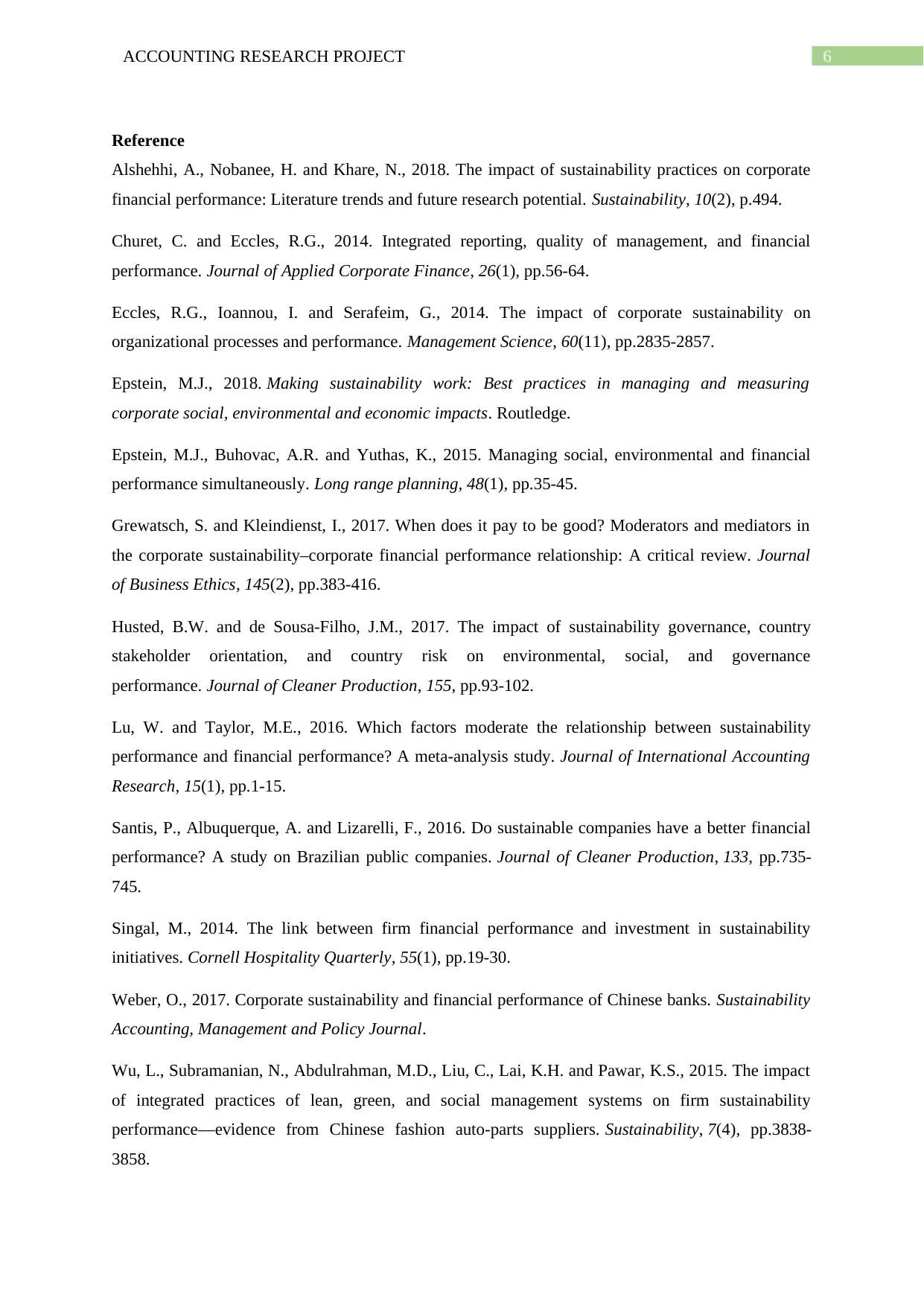
6ACCOUNTING RESEARCH PROJECT
Reference
Alshehhi, A., Nobanee, H. and Khare, N., 2018. The impact of sustainability practices on corporate
financial performance: Literature trends and future research potential. Sustainability, 10(2), p.494.
Churet, C. and Eccles, R.G., 2014. Integrated reporting, quality of management, and financial
performance. Journal of Applied Corporate Finance, 26(1), pp.56-64.
Eccles, R.G., Ioannou, I. and Serafeim, G., 2014. The impact of corporate sustainability on
organizational processes and performance. Management Science, 60(11), pp.2835-2857.
Epstein, M.J., 2018. Making sustainability work: Best practices in managing and measuring
corporate social, environmental and economic impacts. Routledge.
Epstein, M.J., Buhovac, A.R. and Yuthas, K., 2015. Managing social, environmental and financial
performance simultaneously. Long range planning, 48(1), pp.35-45.
Grewatsch, S. and Kleindienst, I., 2017. When does it pay to be good? Moderators and mediators in
the corporate sustainability–corporate financial performance relationship: A critical review. Journal
of Business Ethics, 145(2), pp.383-416.
Husted, B.W. and de Sousa-Filho, J.M., 2017. The impact of sustainability governance, country
stakeholder orientation, and country risk on environmental, social, and governance
performance. Journal of Cleaner Production, 155, pp.93-102.
Lu, W. and Taylor, M.E., 2016. Which factors moderate the relationship between sustainability
performance and financial performance? A meta-analysis study. Journal of International Accounting
Research, 15(1), pp.1-15.
Santis, P., Albuquerque, A. and Lizarelli, F., 2016. Do sustainable companies have a better financial
performance? A study on Brazilian public companies. Journal of Cleaner Production, 133, pp.735-
745.
Singal, M., 2014. The link between firm financial performance and investment in sustainability
initiatives. Cornell Hospitality Quarterly, 55(1), pp.19-30.
Weber, O., 2017. Corporate sustainability and financial performance of Chinese banks. Sustainability
Accounting, Management and Policy Journal.
Wu, L., Subramanian, N., Abdulrahman, M.D., Liu, C., Lai, K.H. and Pawar, K.S., 2015. The impact
of integrated practices of lean, green, and social management systems on firm sustainability
performance—evidence from Chinese fashion auto-parts suppliers. Sustainability, 7(4), pp.3838-
3858.
Reference
Alshehhi, A., Nobanee, H. and Khare, N., 2018. The impact of sustainability practices on corporate
financial performance: Literature trends and future research potential. Sustainability, 10(2), p.494.
Churet, C. and Eccles, R.G., 2014. Integrated reporting, quality of management, and financial
performance. Journal of Applied Corporate Finance, 26(1), pp.56-64.
Eccles, R.G., Ioannou, I. and Serafeim, G., 2014. The impact of corporate sustainability on
organizational processes and performance. Management Science, 60(11), pp.2835-2857.
Epstein, M.J., 2018. Making sustainability work: Best practices in managing and measuring
corporate social, environmental and economic impacts. Routledge.
Epstein, M.J., Buhovac, A.R. and Yuthas, K., 2015. Managing social, environmental and financial
performance simultaneously. Long range planning, 48(1), pp.35-45.
Grewatsch, S. and Kleindienst, I., 2017. When does it pay to be good? Moderators and mediators in
the corporate sustainability–corporate financial performance relationship: A critical review. Journal
of Business Ethics, 145(2), pp.383-416.
Husted, B.W. and de Sousa-Filho, J.M., 2017. The impact of sustainability governance, country
stakeholder orientation, and country risk on environmental, social, and governance
performance. Journal of Cleaner Production, 155, pp.93-102.
Lu, W. and Taylor, M.E., 2016. Which factors moderate the relationship between sustainability
performance and financial performance? A meta-analysis study. Journal of International Accounting
Research, 15(1), pp.1-15.
Santis, P., Albuquerque, A. and Lizarelli, F., 2016. Do sustainable companies have a better financial
performance? A study on Brazilian public companies. Journal of Cleaner Production, 133, pp.735-
745.
Singal, M., 2014. The link between firm financial performance and investment in sustainability
initiatives. Cornell Hospitality Quarterly, 55(1), pp.19-30.
Weber, O., 2017. Corporate sustainability and financial performance of Chinese banks. Sustainability
Accounting, Management and Policy Journal.
Wu, L., Subramanian, N., Abdulrahman, M.D., Liu, C., Lai, K.H. and Pawar, K.S., 2015. The impact
of integrated practices of lean, green, and social management systems on firm sustainability
performance—evidence from Chinese fashion auto-parts suppliers. Sustainability, 7(4), pp.3838-
3858.
1 out of 7
Related Documents
Your All-in-One AI-Powered Toolkit for Academic Success.
+13062052269
info@desklib.com
Available 24*7 on WhatsApp / Email
![[object Object]](/_next/static/media/star-bottom.7253800d.svg)
Unlock your academic potential
Copyright © 2020–2026 A2Z Services. All Rights Reserved. Developed and managed by ZUCOL.





